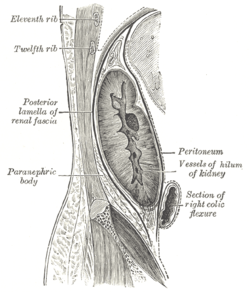Loin pain hematuria syndrome

Editor-In-Chief: Prab R Tumpati, MD
Obesity, Sleep & Internal medicine
Founder, WikiMD Wellnesspedia &
W8MD medical weight loss NYC and sleep center NYC
| Loin pain hematuria syndrome | |
|---|---|

| |
| Synonyms | LPHS |
| Pronounce | |
| Specialty | Nephrology |
| Symptoms | Loin pain, hematuria |
| Complications | N/A |
| Onset | |
| Duration | |
| Types | |
| Causes | Unknown |
| Risks | |
| Diagnosis | Clinical diagnosis, urinalysis, imaging studies |
| Differential diagnosis | Kidney stones, urinary tract infection, glomerulonephritis |
| Prevention | |
| Treatment | Pain management, surgical intervention |
| Medication | Analgesics, antidepressants |
| Prognosis | Variable |
| Frequency | Rare |
| Deaths | |
Loin pain hematuria syndrome (LPHS) is a rare medical condition characterized by severe, unexplained flank pain (loin pain) and hematuria (blood in the urine). The syndrome primarily affects young adults and can lead to significant morbidity due to chronic pain and recurrent episodes of hematuria.
Presentation[edit]
Patients with LPHS typically present with severe, unilateral or bilateral flank pain that can be constant or intermittent. The pain is often described as sharp, stabbing, or throbbing and can be debilitating. Hematuria, which may be visible (gross hematuria) or detectable only under a microscope (microscopic hematuria), is a hallmark of the condition. Other symptoms may include nausea, vomiting, and fatigue.
Etiology[edit]
The exact cause of LPHS is unknown. Several theories have been proposed, including:
Diagnosis[edit]
The diagnosis of LPHS is primarily clinical, based on the characteristic symptoms of loin pain and hematuria. Diagnostic tests may include:
- Urinalysis to detect hematuria
- Imaging studies such as ultrasound, CT scan, or MRI to rule out other causes of flank pain and hematuria
- Renal biopsy in some cases to exclude other renal pathologies
Management[edit]
Management of LPHS is challenging and often requires a multidisciplinary approach. Treatment options may include:
- Pain management with analgesics, including nonsteroidal anti-inflammatory drugs (NSAIDs) and opioids
- Nerve blocks or neurostimulation techniques
- Surgical interventions such as renal denervation or nephrectomy in severe cases
- Supportive care and psychological support
Prognosis[edit]
The prognosis of LPHS varies. Some patients may experience spontaneous resolution of symptoms, while others may have chronic, persistent pain and recurrent hematuria. The condition can significantly impact the quality of life and may lead to depression and anxiety.
See also[edit]
Ad. Transform your life with W8MD's Budget GLP-1 injections from $75


W8MD offers a medical weight loss program to lose weight in Philadelphia. Our physician-supervised medical weight loss provides:
- Weight loss injections in NYC (generic and brand names):
- Zepbound / Mounjaro, Wegovy / Ozempic, Saxenda
- Most insurances accepted or discounted self-pay rates. We will obtain insurance prior authorizations if needed.
- Generic GLP1 weight loss injections from $75 for the starting dose.
- Also offer prescription weight loss medications including Phentermine, Qsymia, Diethylpropion, Contrave etc.
NYC weight loss doctor appointmentsNYC weight loss doctor appointments
Start your NYC weight loss journey today at our NYC medical weight loss and Philadelphia medical weight loss clinics.
- Call 718-946-5500 to lose weight in NYC or for medical weight loss in Philadelphia 215-676-2334.
- Tags:NYC medical weight loss, Philadelphia lose weight Zepbound NYC, Budget GLP1 weight loss injections, Wegovy Philadelphia, Wegovy NYC, Philadelphia medical weight loss, Brookly weight loss and Wegovy NYC
|
WikiMD's Wellness Encyclopedia |
| Let Food Be Thy Medicine Medicine Thy Food - Hippocrates |
Medical Disclaimer: WikiMD is not a substitute for professional medical advice. The information on WikiMD is provided as an information resource only, may be incorrect, outdated or misleading, and is not to be used or relied on for any diagnostic or treatment purposes. Please consult your health care provider before making any healthcare decisions or for guidance about a specific medical condition. WikiMD expressly disclaims responsibility, and shall have no liability, for any damages, loss, injury, or liability whatsoever suffered as a result of your reliance on the information contained in this site. By visiting this site you agree to the foregoing terms and conditions, which may from time to time be changed or supplemented by WikiMD. If you do not agree to the foregoing terms and conditions, you should not enter or use this site. See full disclaimer.
Credits:Most images are courtesy of Wikimedia commons, and templates, categories Wikipedia, licensed under CC BY SA or similar.
Translate this page: - East Asian
中文,
日本,
한국어,
South Asian
हिन्दी,
தமிழ்,
తెలుగు,
Urdu,
ಕನ್ನಡ,
Southeast Asian
Indonesian,
Vietnamese,
Thai,
မြန်မာဘာသာ,
বাংলা
European
español,
Deutsch,
français,
Greek,
português do Brasil,
polski,
română,
русский,
Nederlands,
norsk,
svenska,
suomi,
Italian
Middle Eastern & African
عربى,
Turkish,
Persian,
Hebrew,
Afrikaans,
isiZulu,
Kiswahili,
Other
Bulgarian,
Hungarian,
Czech,
Swedish,
മലയാളം,
मराठी,
ਪੰਜਾਬੀ,
ગુજરાતી,
Portuguese,
Ukrainian
